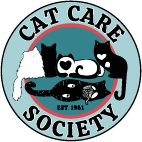Sign up for our Mewsletter!
Nibbles &
Kibbles
Cat Care Society’s emergency food bank offers cat food and supplies to people experiencing temporary financial challenges. Open 1st and 3rd Saturdays, 10 a.m. to noon.
Our Mission
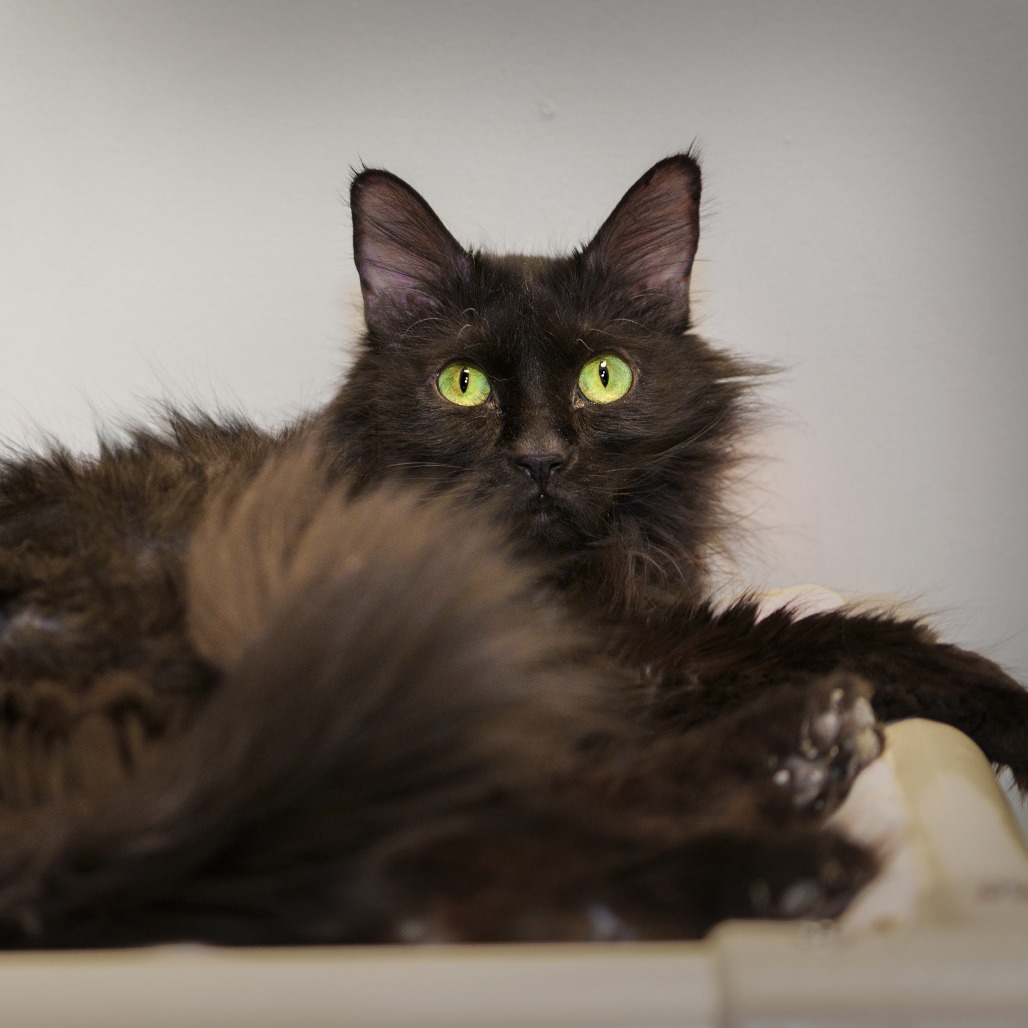
Meet Olive
Lonely Hearts Club Member
Olive is a spunky 7-year-old diabetic cat. With a mischievous personality, she’s quickly become a favorite amongst the staff at CCS. If you adopt Olive, we assure you there will never be a dull day in your household again! View her profile to learn more.
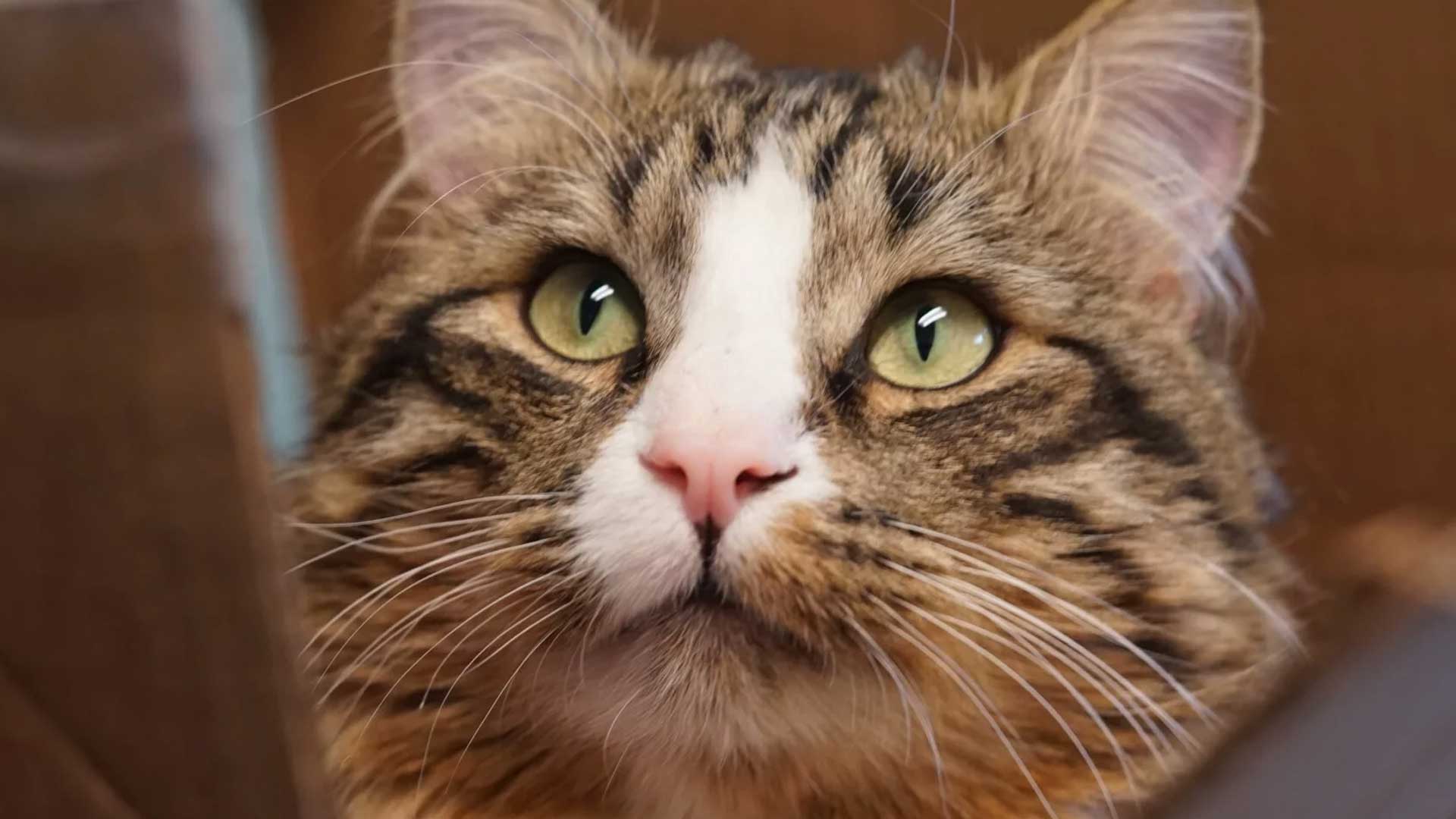
Adopt
Save a life and find your new best friend while opening up more space in the shelter. After picking out your purrfect match, apply to adopt!
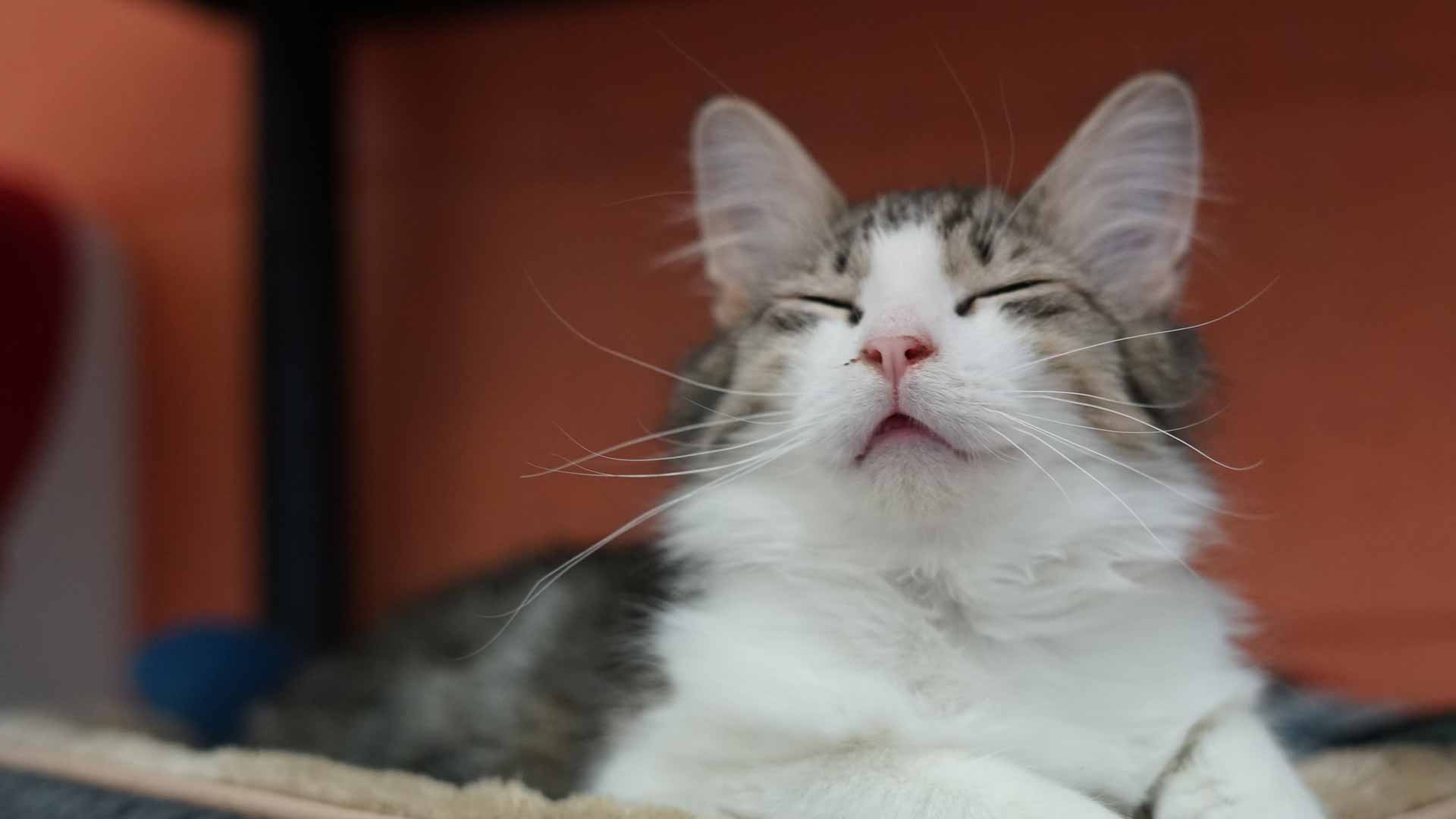
Foster
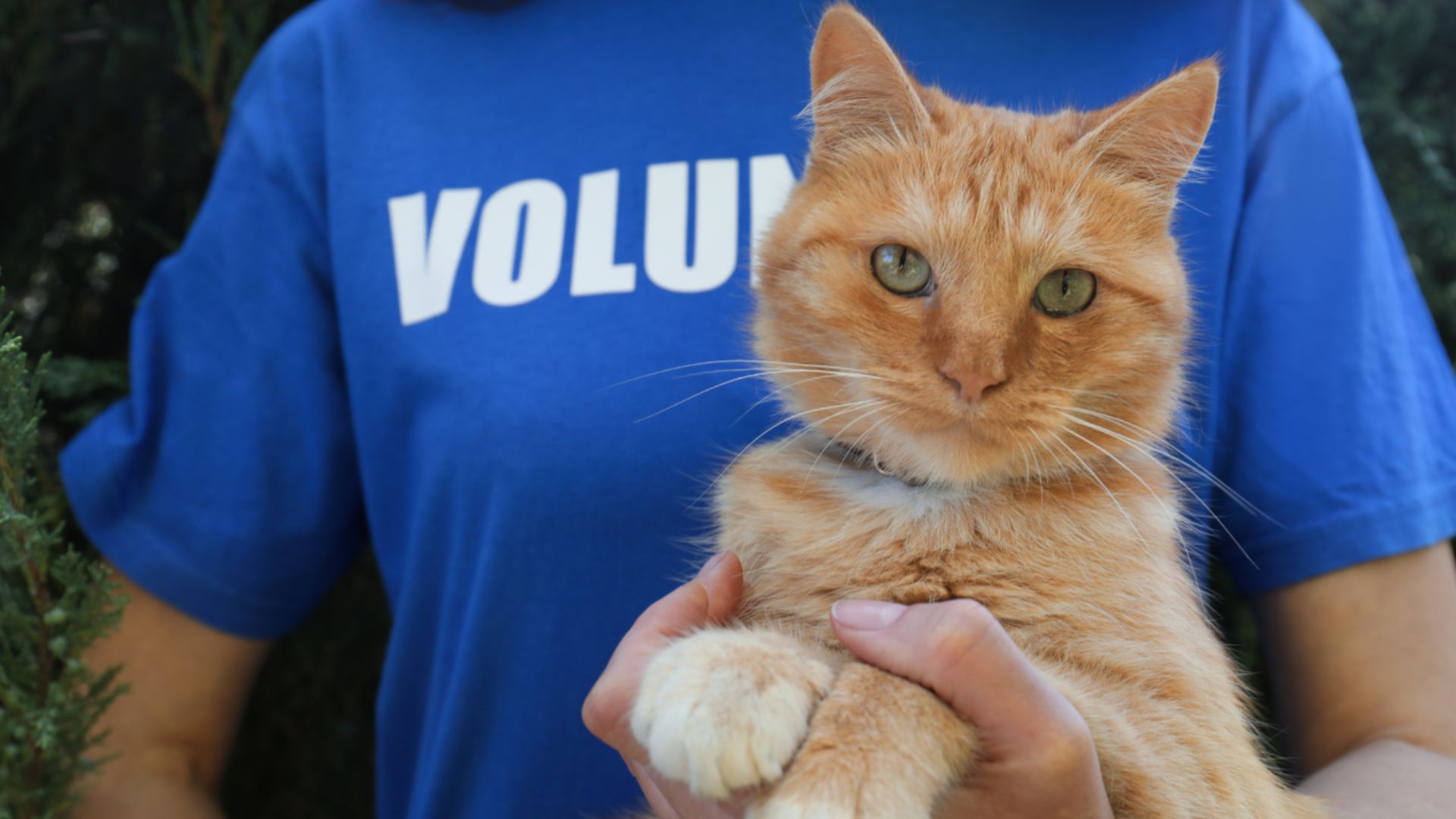
Volunteer
Get involved by giving back! We have many volunteer roles available to help support the cats in our shelter. A few hours can make a world of difference.
Upcoming Events
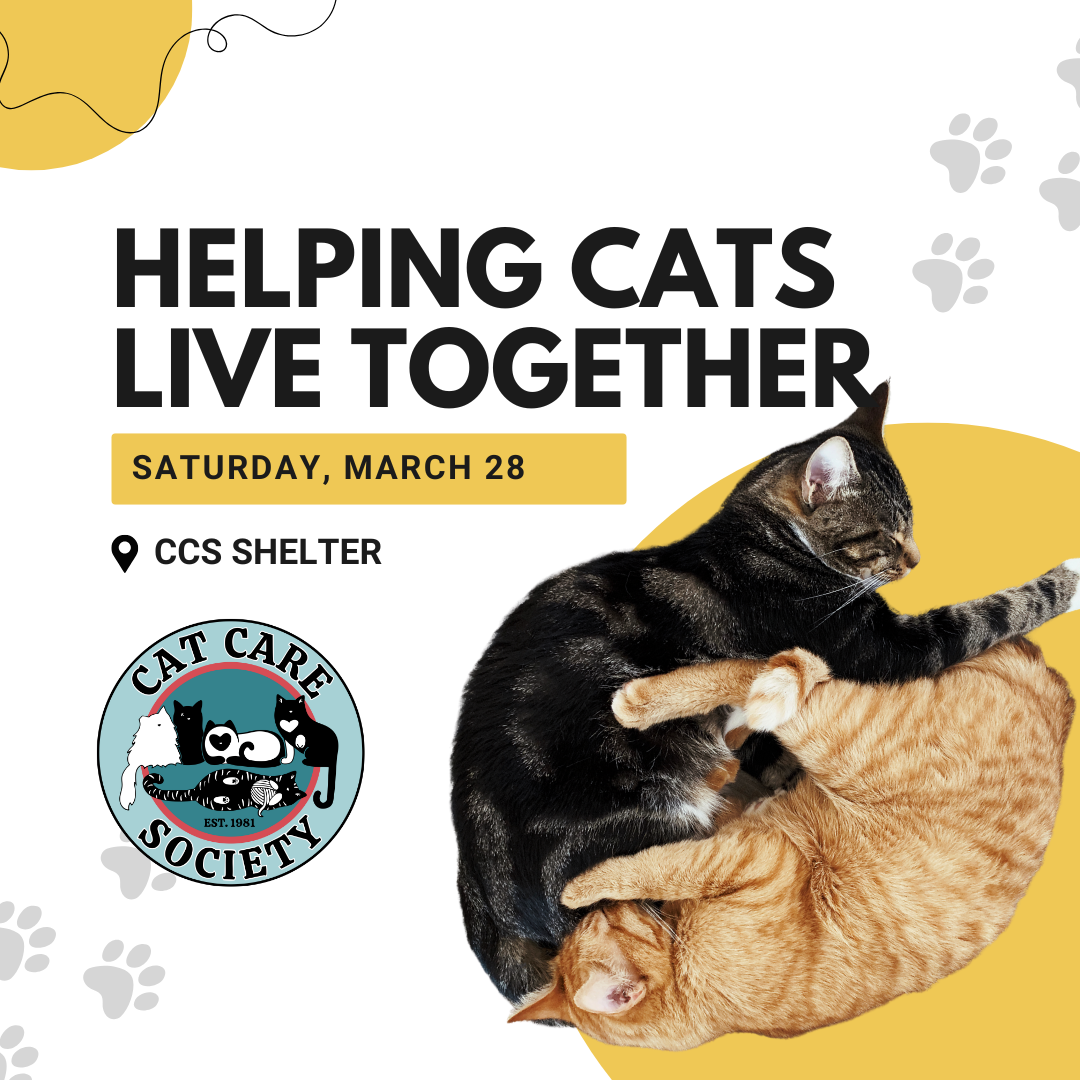
Free Seminar: Helping Cats Live Together
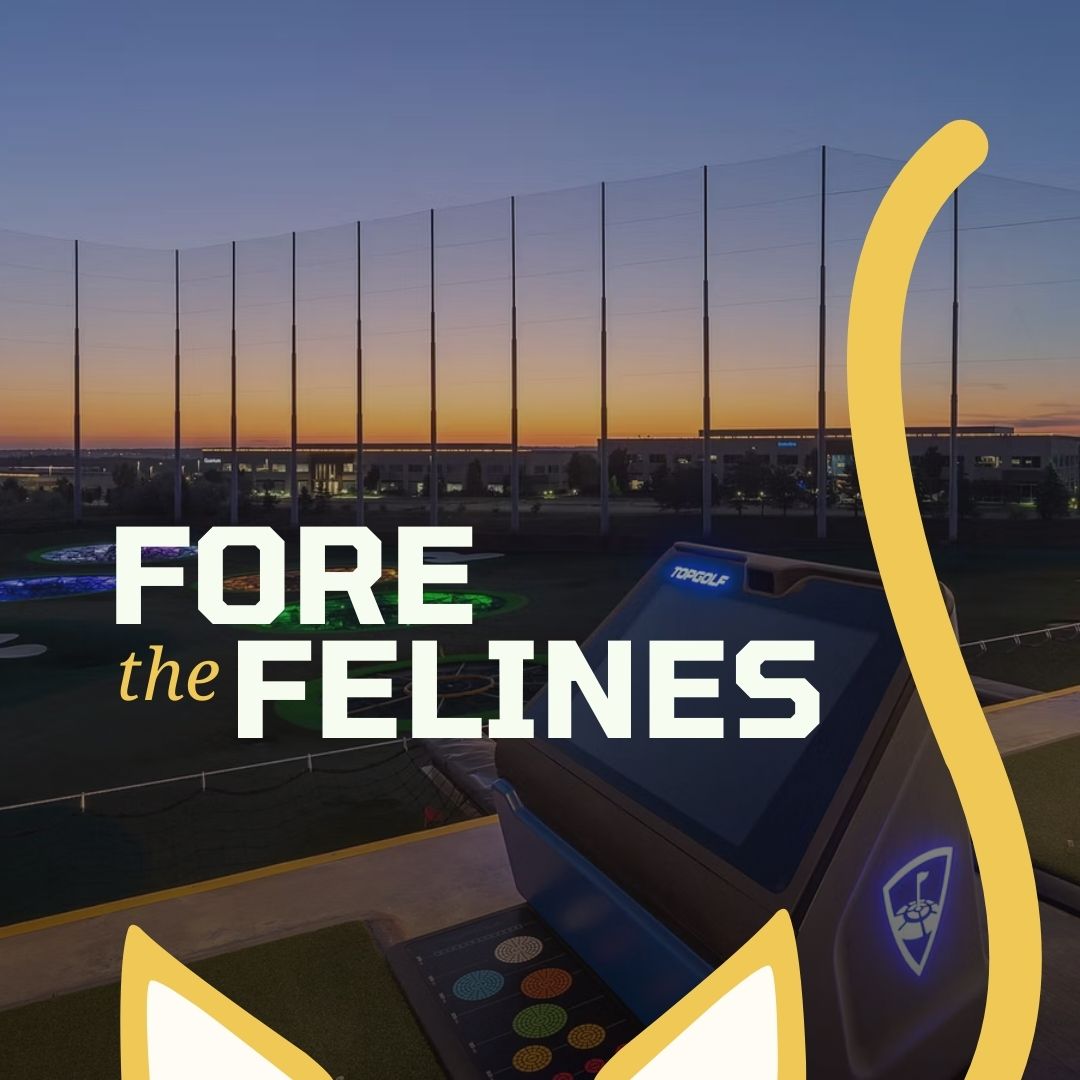
Fore the Felines at Topgolf & Online Auction
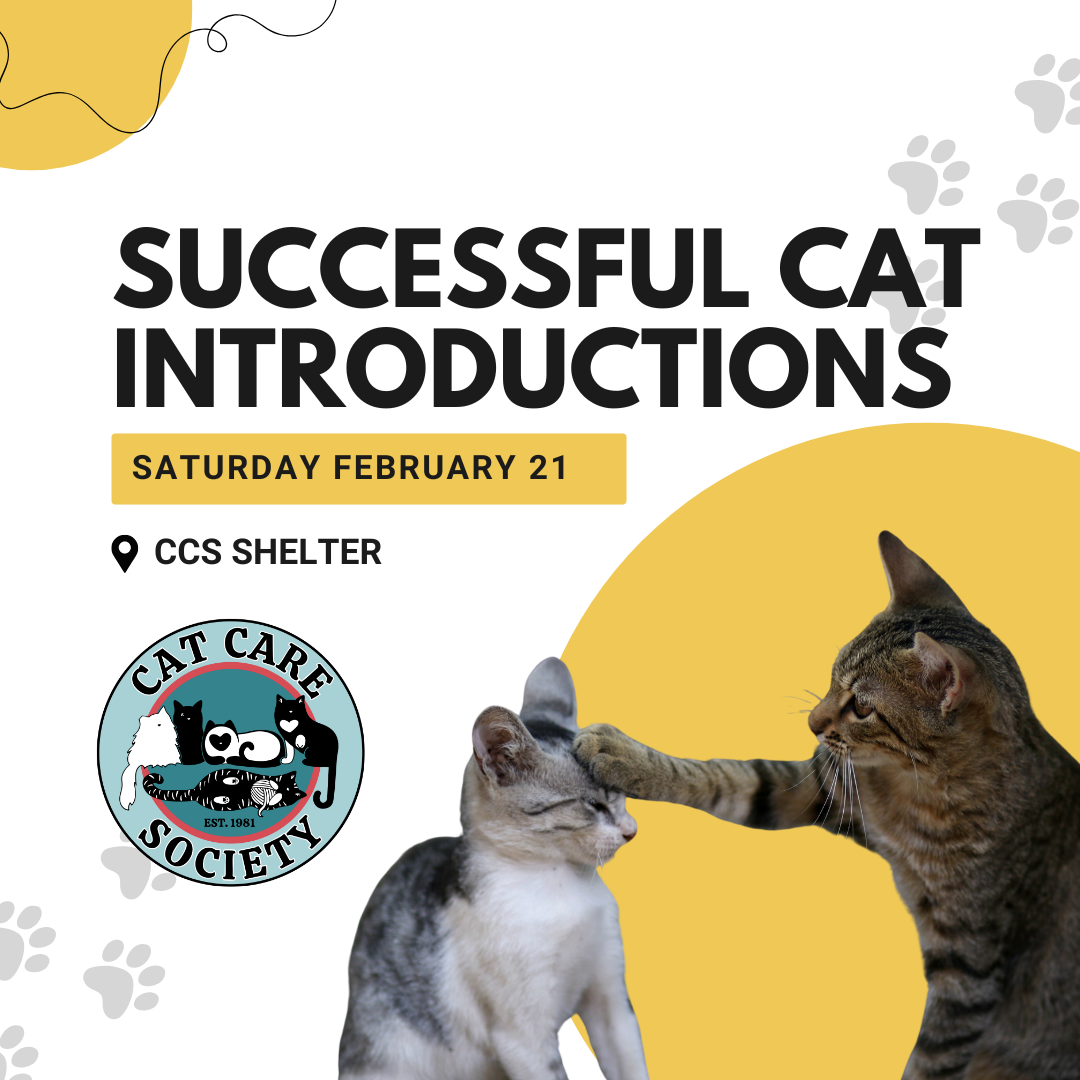
Free Seminar: Successful Cat Introductions

Art from the Heart: Online Art Auction
- Ends February 28, 2026
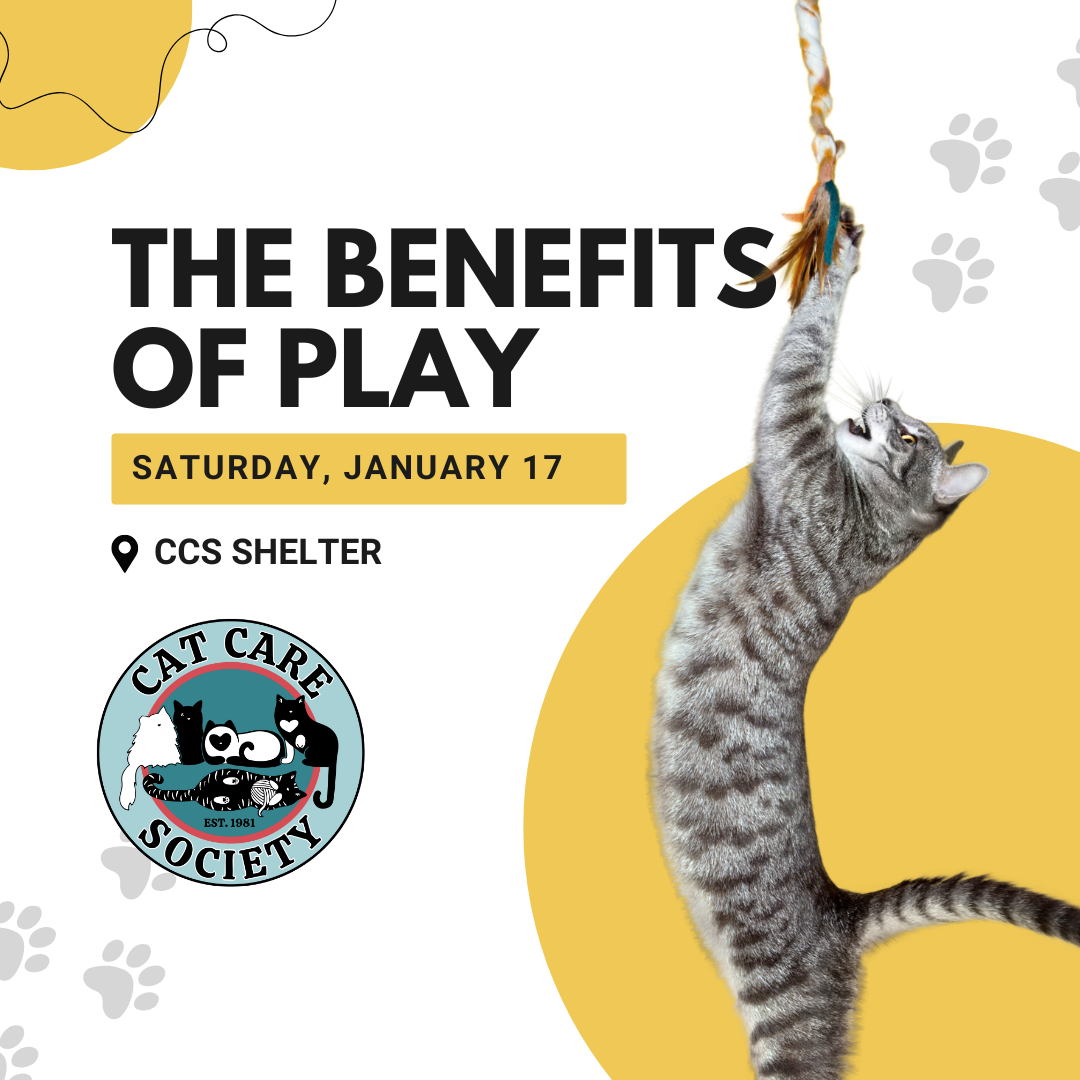
Free Seminar: The Benefits of Play

Colorado Gives Day
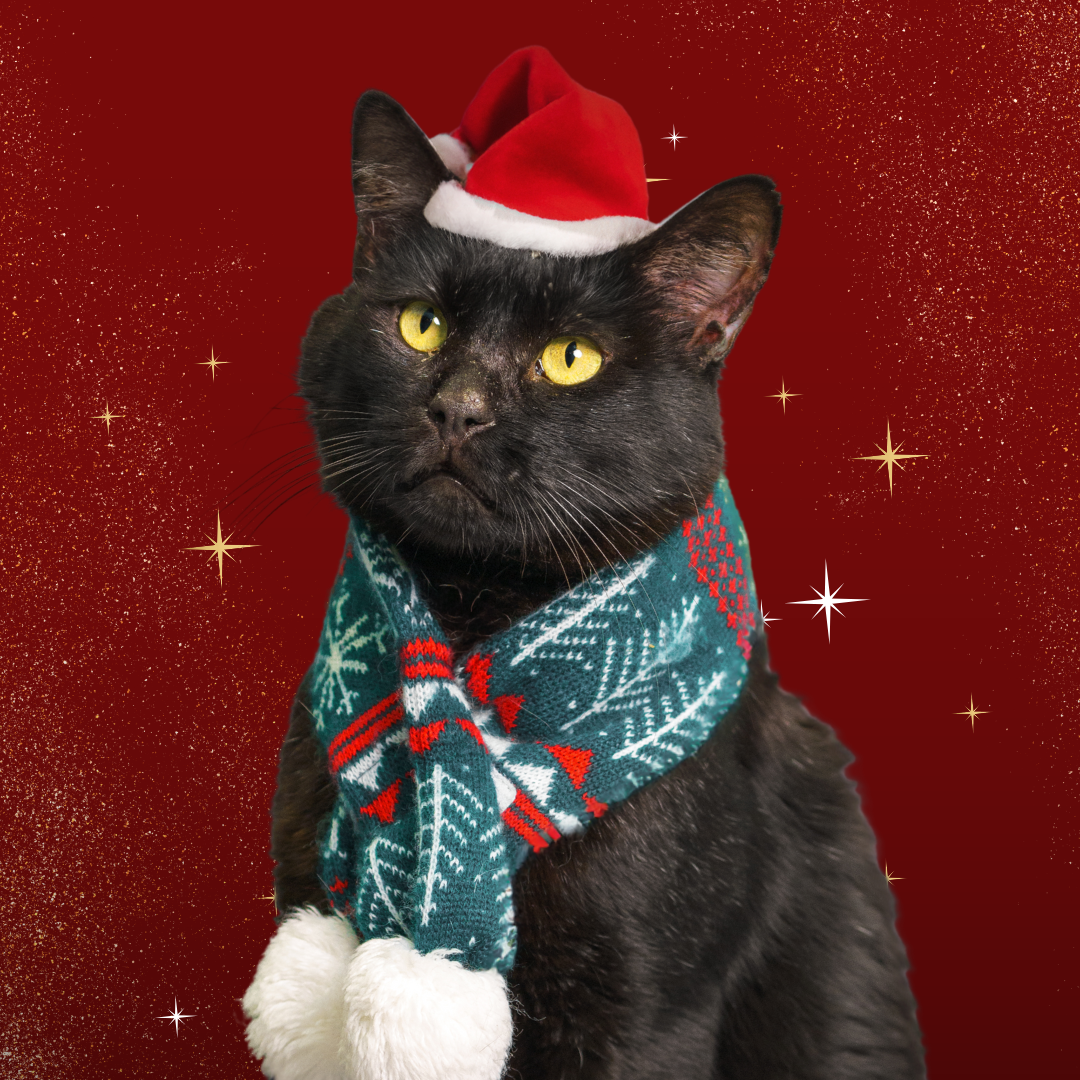
Santa Paws
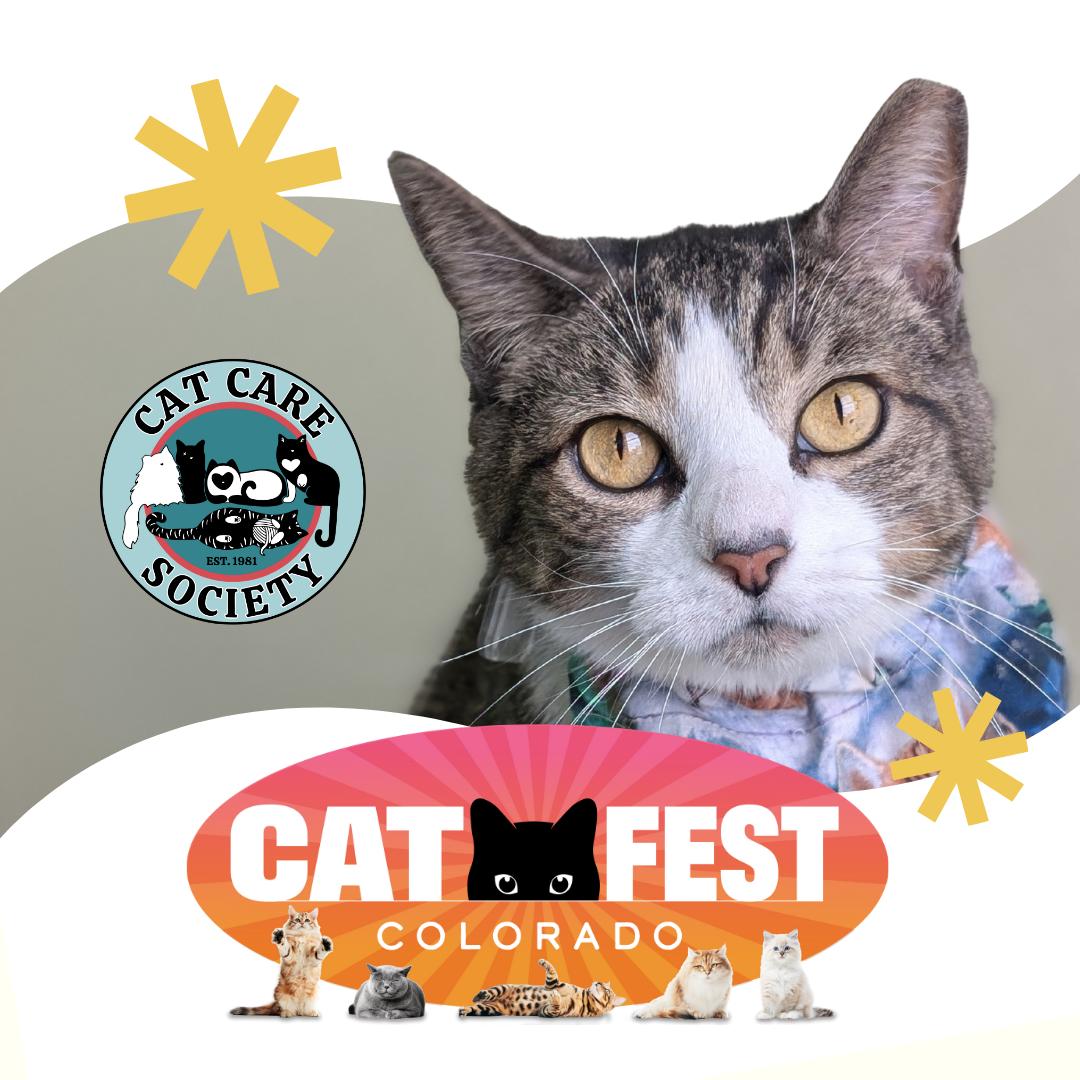
Cat Fest Colorado
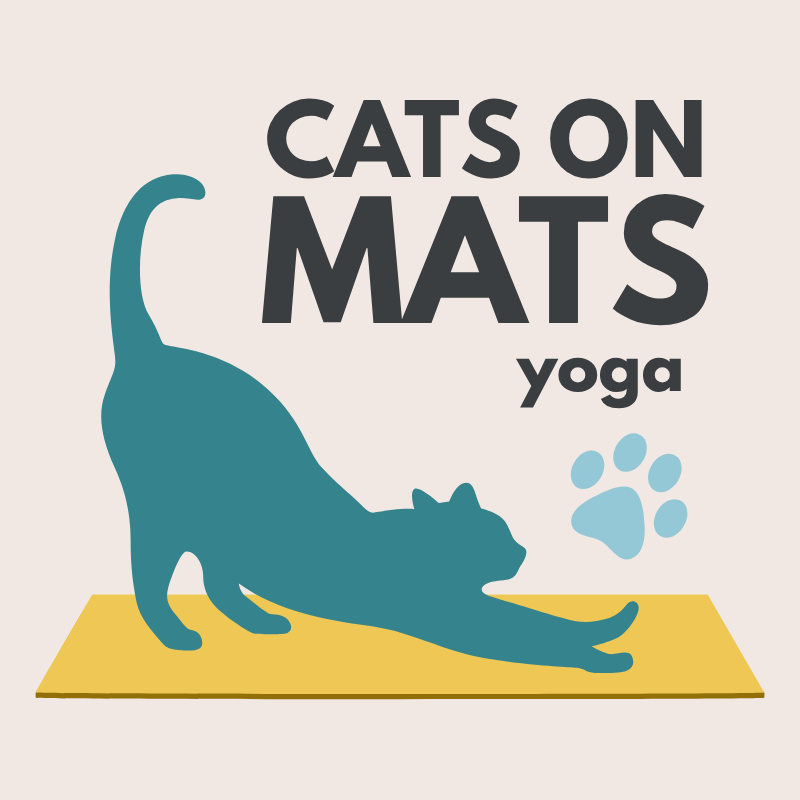
Cats on Mats – Shelter Yoga
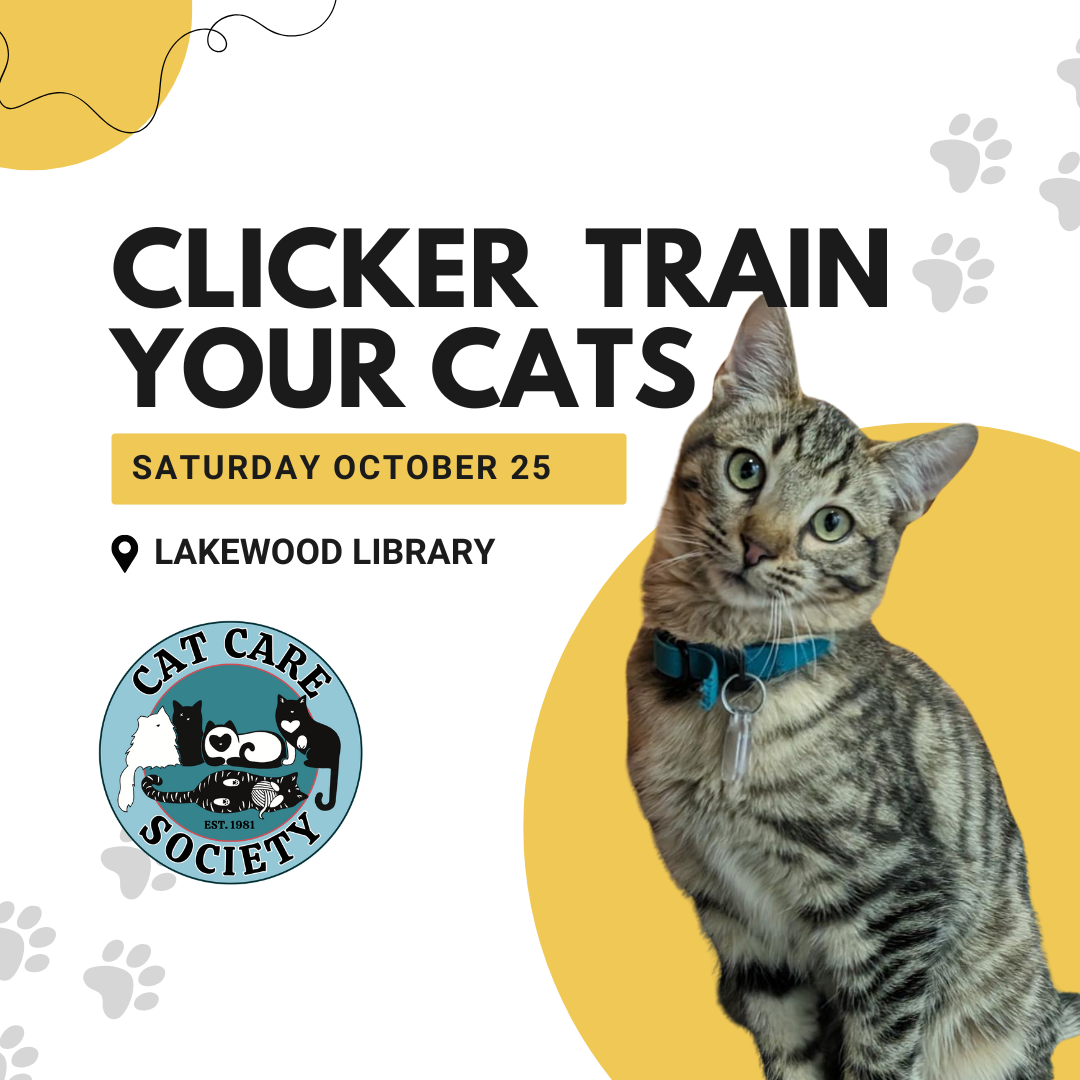
Free Seminar: Clicker Training Your Cats
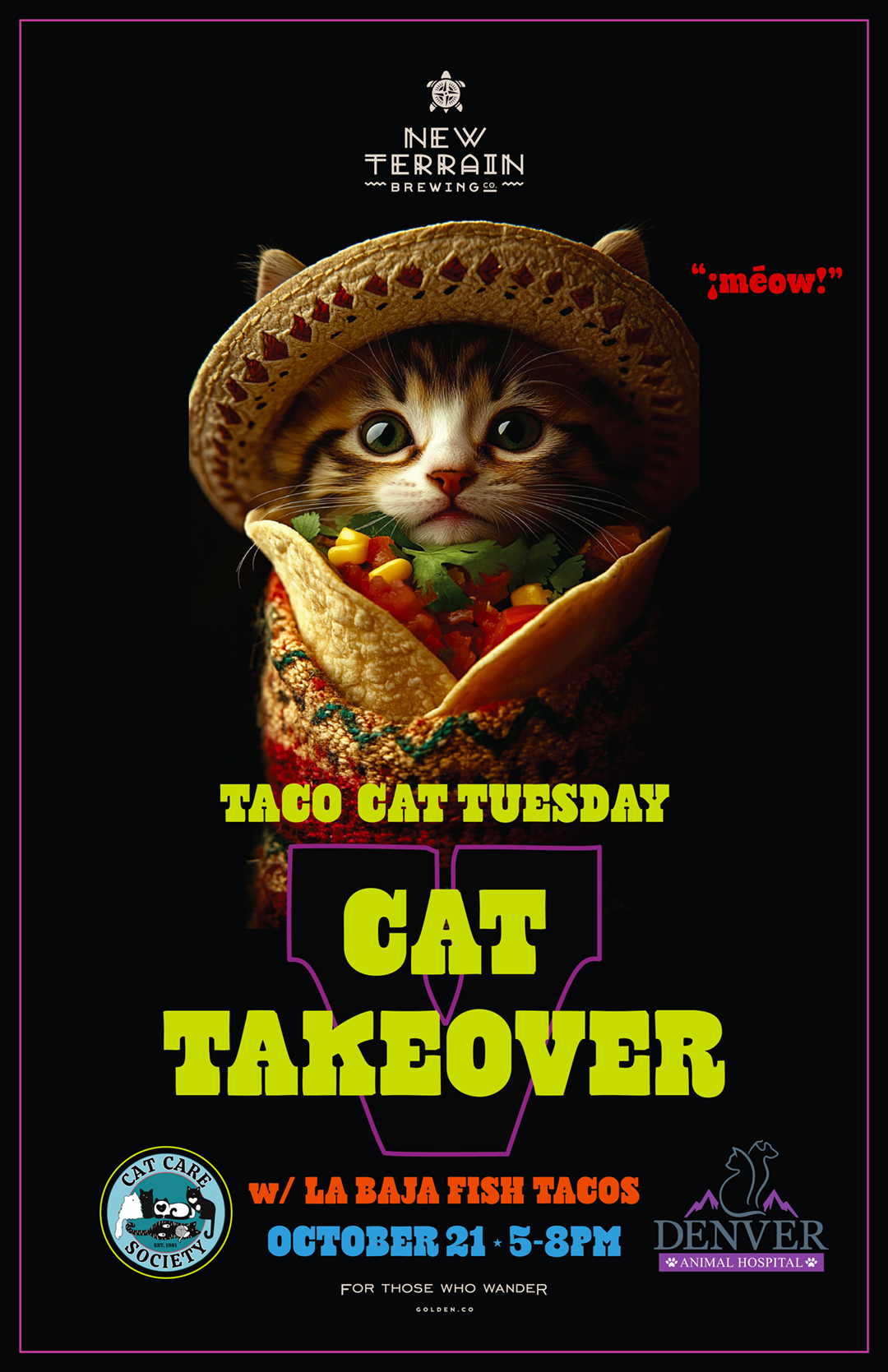
Cat Takeover at New Terrain Brewing Co.

Tails of the Painted Cats

Duet Drag Show Benefitting Cat Care Society
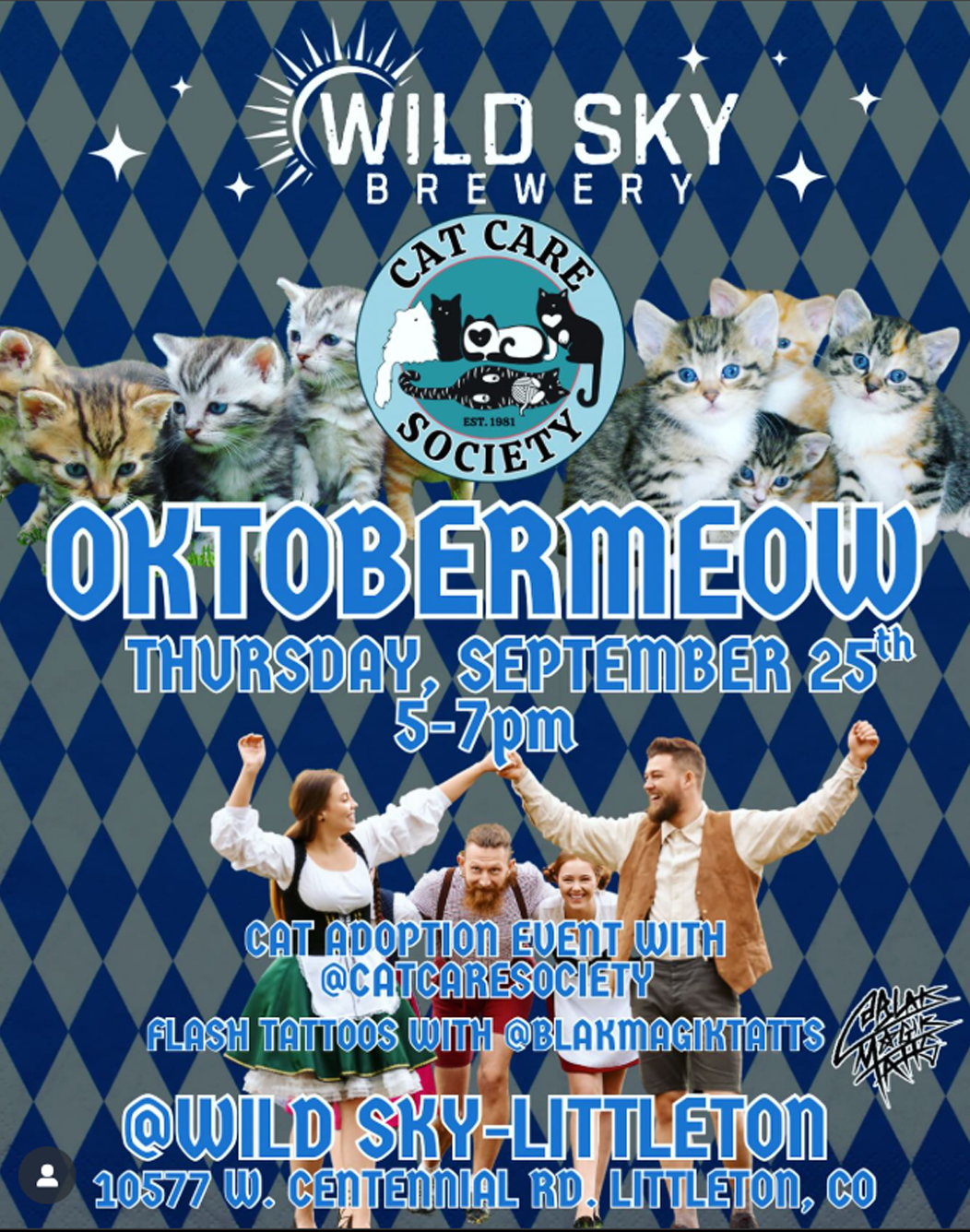
Oktobermeow at Wild Sky Brewery

Free Seminar: Estate Planning with Your Pets in Mind
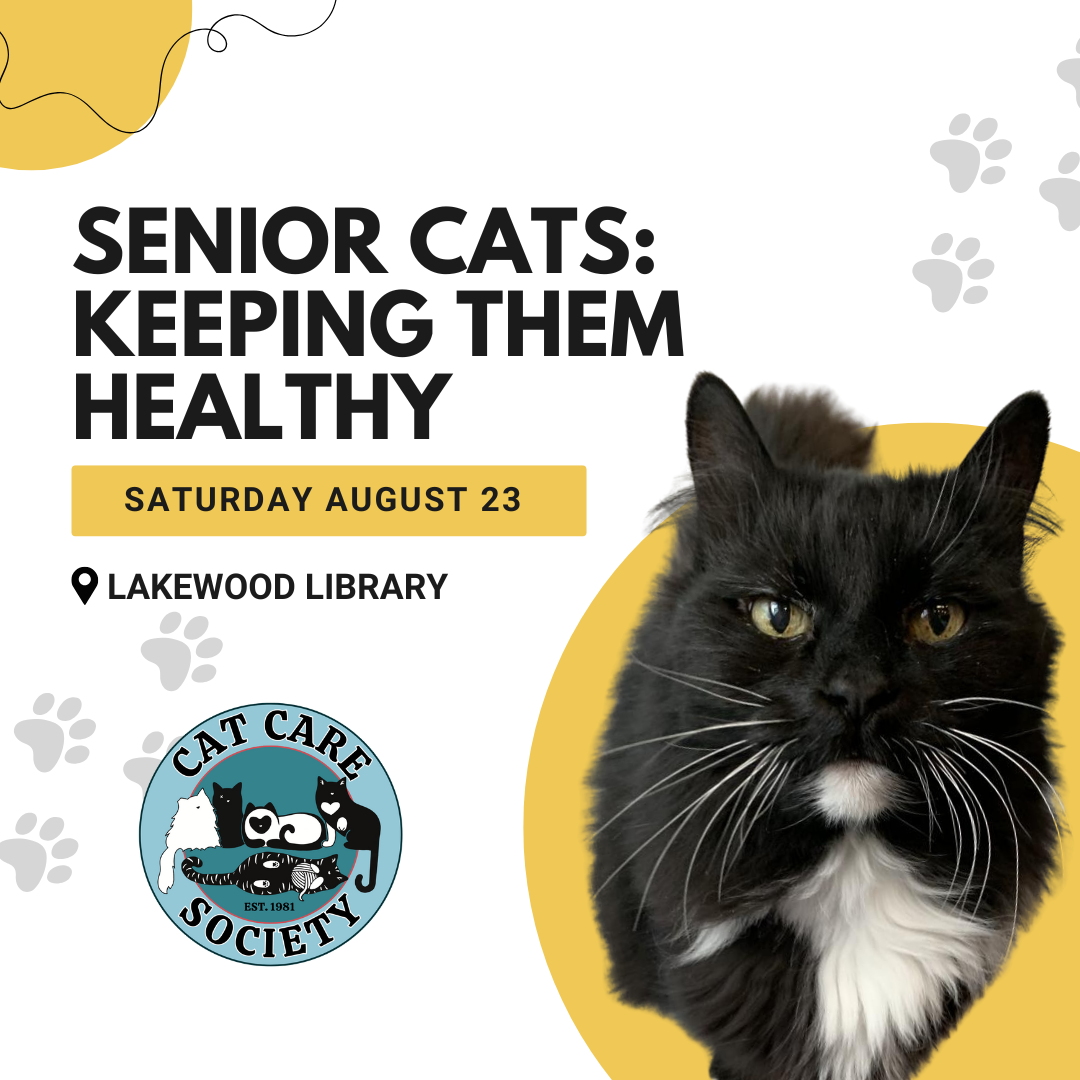
Free Seminar: Keeping Senior Cats Healthy
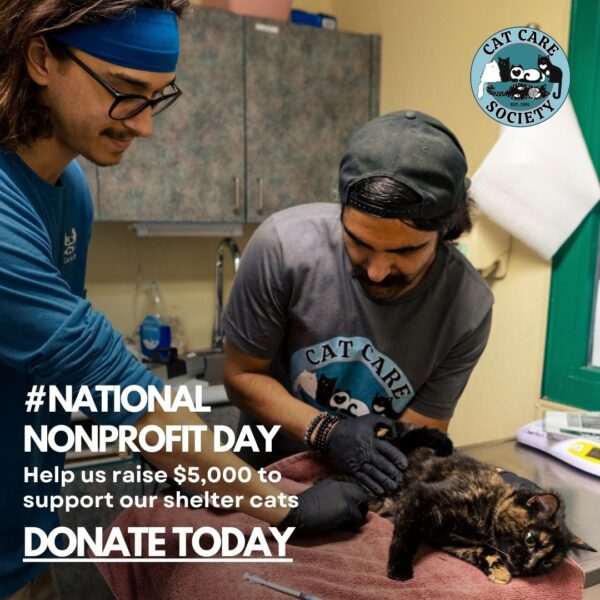
National Nonprofit Day
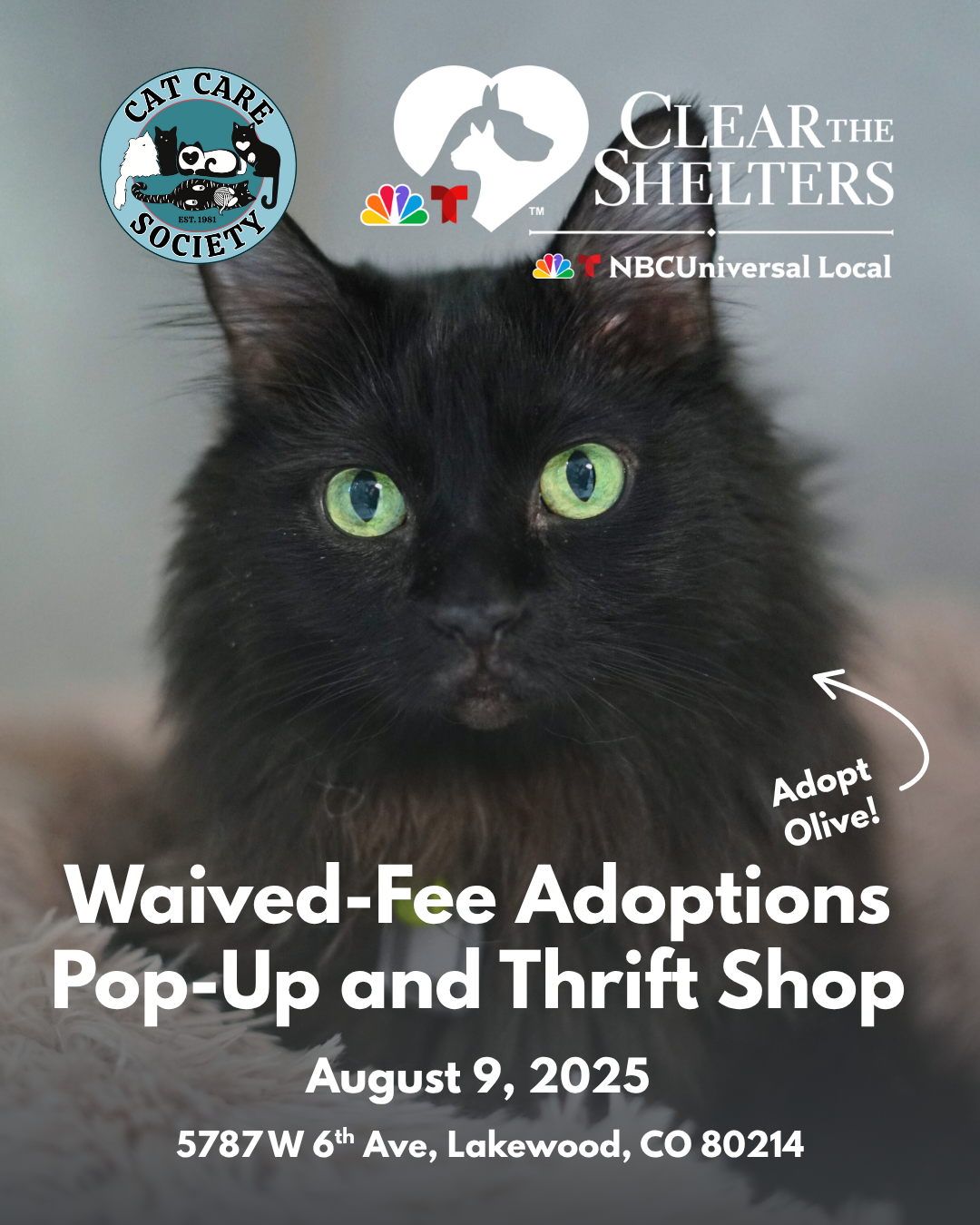
Adoption Event & Thrift Shop: Clear the Shelters
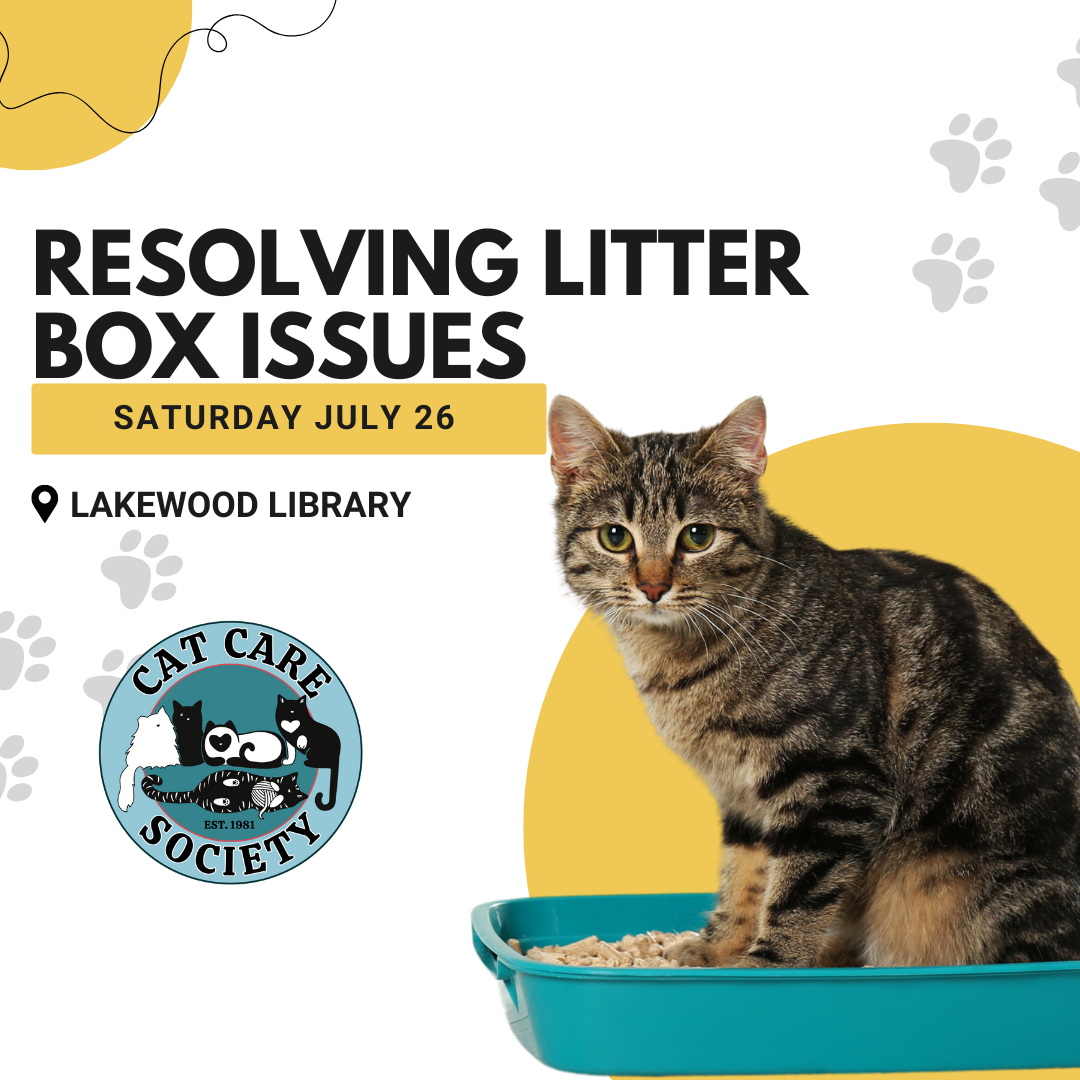
Free Seminar: Resolving Litter Box Issues
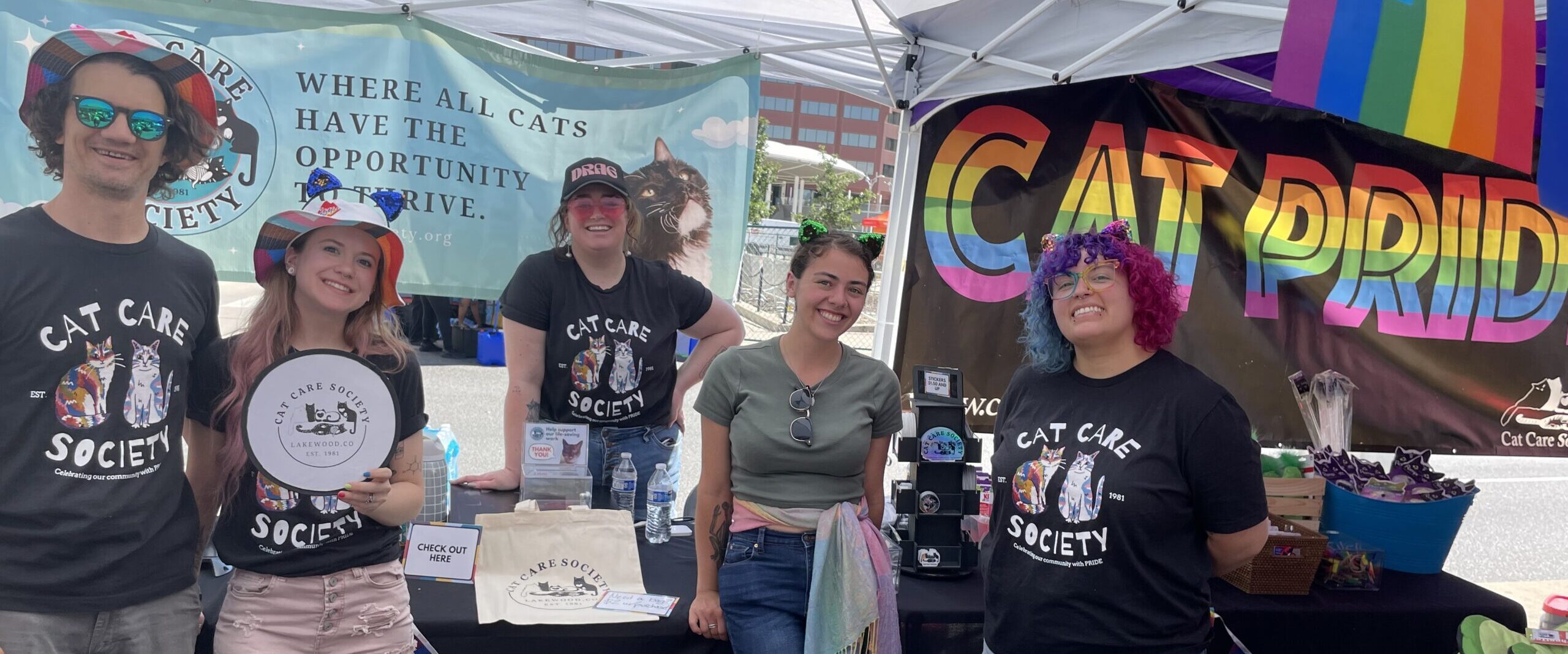
CCS at Denver PrideFest
- Ends June 29, 2025
The Whisker Whisper Blog
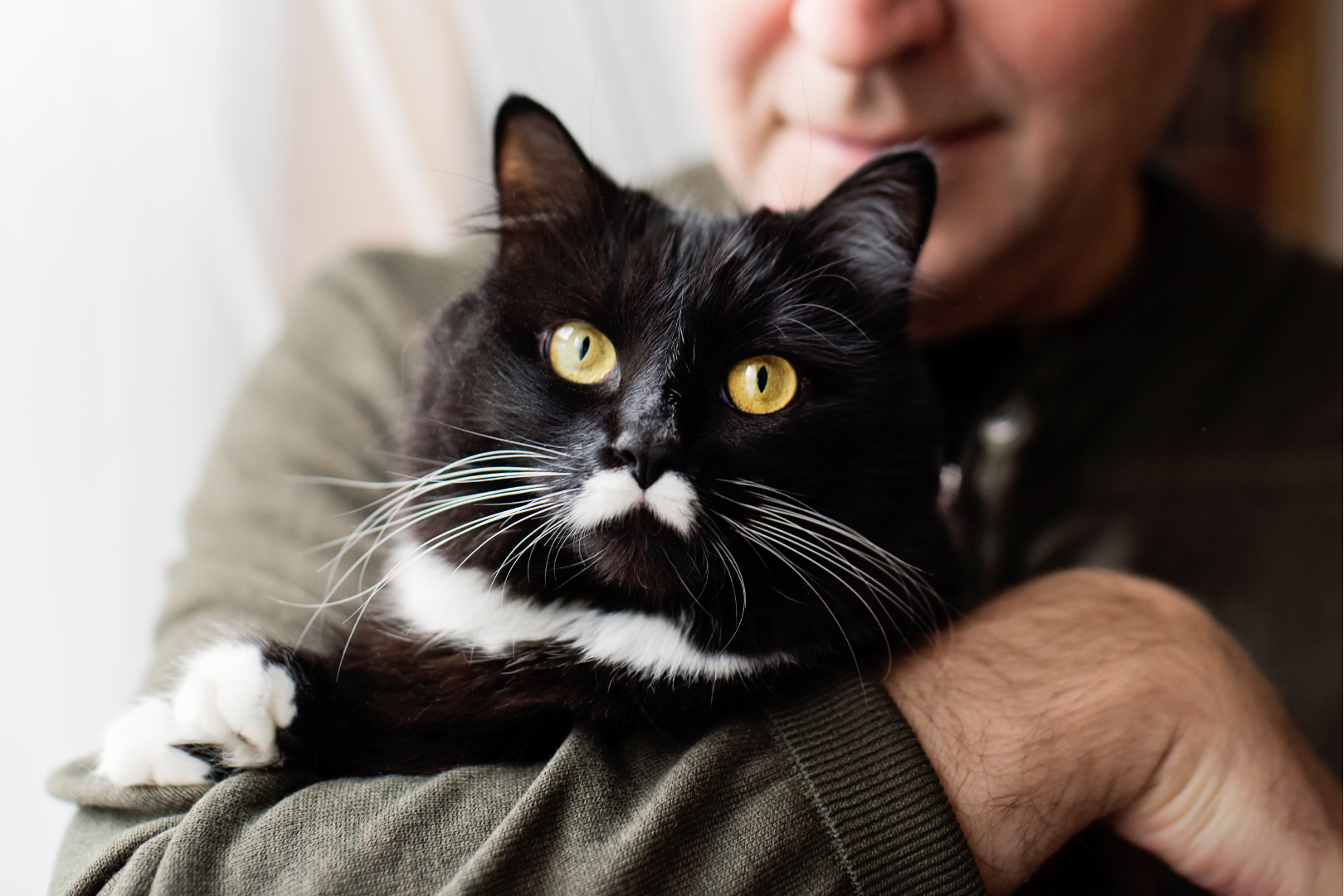
Feline Herpes (FHV-1): Demystifying Myths and What You Need to Know
If you’ve ever browsed cat adoption profiles and come across the phrase “feline herpes positive,” you might hesitate at first. It sounds intimidating—but it doesn’t have to be. With a bit of knowledge and some extra loving care, cats with FHV-1 can live happy and healthy lives just like any other cat. In this article, you’ll learn what feline herpes is, what can trigger flare-ups, and how simple, informed care can make adopting an FHV-1 cat a deeply rewarding experience.
What is feline herpes and how is it spread?
Because of its latency and potential reactivation, FHV‑1 is often misinterpreted as a chronic disease—but it behaves more like a “flareable” virus than a constantly debilitating one.
Feline herpesvirus type 1 (FHV‑1), also called feline viral rhinotracheitis (FVR), is one of the most common viral infections in cats. Any cat can contract FHV-1, but younger cats are most often affected. FHV-1 can be spread through saliva as well as nasal and eye discharge, either directly from the cat or from a contaminated object like a toy or food dish. After initial exposure, the virus typically causes an upper respiratory and ocular infection (sneezing, nasal/eye discharge, conjunctivitis) lasting around 10–20 days in mild cases.
Even once the acute symptoms have resolved, the virus remains in a dormant state in nerve tissues for the cat’s life. The virus is most likely to reactivate if the cat experiences stress or an immune system challenge. When it reactivates, it causes a flare-up. Many cats experience very mild or even subclinical symptoms when a flare-up occurs.
FHV-1 vs. FIV vs. FeLV
It’s easy to confuse FHV‑1 with other feline viruses like FIV (feline immunodeficiency virus) or FeLV (feline leukemia virus), but they’re quite different. FHV‑1 is a respiratory virus that causes flare-ups like sneezing and eye discharge, but doesn’t impact a cat’s immune system the way the other two do. FIV is an immune-compromising virus primarily spread through deep bite wounds, while FeLV is a retrovirus that can suppress immune function and is more easily spread through prolonged close contact like grooming or shared dishes. Each virus has its realities, but none are an automatic disqualifier for a loving, quality life.
Myth vs. Reality: Common Misconceptions About FHV-1
Myth 1: “Having FHV-1 means the cat will have a low quality of life that’s filled with constant illness and discomfort.”
Reality: Most cats recover from initial infection and go on to lead essentially normal lives. While younger kittens, immunocompromised cats, or those with other illnesses might experience a more severe disease, serious outcomes are relatively rare in otherwise healthy cats.
Myth 2: “A cat with FHV-1 will always be symptomatic.”
Reality: Many cats are asymptomatic carriers most of the time, with flare-ups only under stress (e.g. moving, travel, other illness). In fact, viral shedding (when the cat is contagious) is much more likely during active episodes; in dormancy, shedding is minimal or absent.
Myth 3: “Herpes in cats is like herpes in people and can spread to humans or dogs.”
Reality: FHV‑1 is species-specific; humans and dogs cannot contract feline herpes.
Myth 4: “You can cure FHV-1 completely.”
Reality: There is no cure for herpes in cats. The goal is managing symptoms, reducing flare frequency and severity, and supporting the cat’s overall health through good nutrition and enrichment.
Myth 5: “You can prevent FHV-1 completely.”
Reality: One of the core vaccines recommended for kittens and adult cats by the Feline Veterinary Medical Association is the FHV-1 vaccine. While this vaccine doesn’t completely eliminate the chances of the cat contracting FHV-1, it is highly effective at preventing severe illness, including symptom severity and duration, and it also helps limit the cat’s viral shedding and how contagious it is to other cats. This vaccine is often administered as part of a combination vaccine called FVRCP, which protects against Feline Viral Rhinotracheitis, Calicivirus, and Panleukopenia. All cats at Cat Care Society are given the FVRCP vaccine according to the recommended schedule.
As you can see, the reality is that cats with FHV-1 can still live long, happy lives with proper care, love, and a stable environment that supports their health and comfort.
Helpful Things to Know Before Adopting a Cat with FHV‑1
If a shelter informs you that a cat you’re interested in adopting has FHV-1, keep the following considerations and tips in mind to help your future feline friend thrive:
1. Review and discuss the cat’s medical records and history
At CCS, if a cat is suspected of having feline herpes, it will be noted in their medical records along with information about the virus. It’s also important to understand if the cat has any other co-existing conditions, like upper respiratory illness or eye concerns, that might complicate flare management. Understanding the individual cat’s history gives you a more accurate sense of what to expect so you can be prepared. You should also share this information with your veterinarian so they can create a treatment and management plan. In most cases, FHV-1 symptoms are non-life threatening and the cat will respond well to general supportive care.
2. Prepare for occasional flares
Be aware of the respiratory and ocular signs of a flare-up, such as sneezing, watery eyes, discharge, and corneal irritation or ulcers, especially in times of stress. During those times, vet support (antivirals, topical ocular medication, secondary infection treatment) plus extra care at home can often resolve symptoms.
3. Stress reduction is essential
Stress is one of the strongest triggers for viral reactivation. Strategies to help minimize stress include:
- Creating a calm, stable environment with hiding spots, vertical spaces, predictable routines
- Minimizing abrupt changes (moving, new pets, loud renovation)
- Using enrichment (puzzles, play, cuddles, and other activities your cat enjoys)
- Avoiding overcrowding or competition in a multi-cat home, e.g., make sure there are adequate litter boxes, feeding time is comfortable, and there’s a place for the cat to have alone time when needed
4. Supportive care—daily and during flares
Even when asymptomatic, certain practices, in addition to stress reduction, can reduce flare risk and flare severity:
- Keep vaccinations current (especially FVRCP).
- Maintain high nutrition and hydration.
- During a flare, provide extra comfort (warm, humid environment, nasal/ocular cleaning, appetite support), follow vet-prescribed medication instructions.
- If in a multi-cat household:
Adopting a Cat with Herpes Is a Worthy Decision
Many potential adopters hesitate when they see an FHV-1–positive cat, but choosing to adopt one and offering them a loving home can be truly life-changing—for both of you. Here at CCS, we’ve received many heartwarming updates from adopters whose herpes-positive cats are thriving, underscoring that with care and compassion these cats can live long, joyful lives. If you’d like more information on FHV-1, including details on how the virus works and common treatment regiments, check out this great article by VCA Animal Hospitals.
About the Author: Beth Dokolasa is a volunteer for Cat Care Society and serves on the Board of Directors. She is an instructional developer for Natural Grocers and lives in Indian Hills, Colo., with her husband, daughter, and two cats, Techno and Digit.
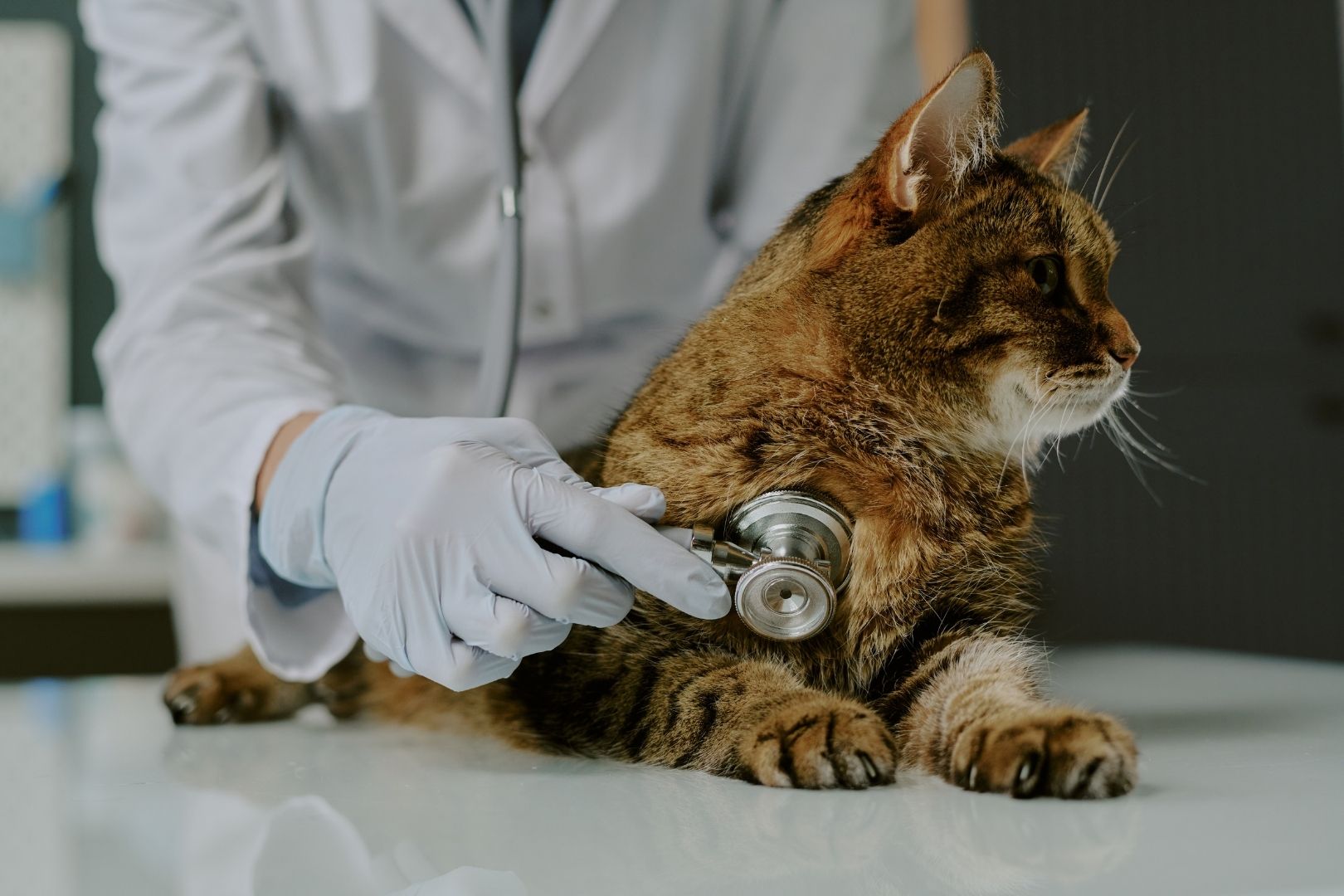
Why Every Cat Needs Routine Vet Checkups
When was the last time you took your cat for a wellness exam? If you can’t remember, this article is for you—and you’re definitely not alone. Many people don’t consider taking their cat to the vet unless there’s an obvious issue, but this can unfortunately jeopardize their health and well-being. Cats are experts at hiding pain and illness, and by the time a problem becomes visible, it may already be advanced. Routine veterinary care is one of the most important things you can do to keep a cat healthy throughout their life.
Why Wellness Checkups Are Important
Cats instinctively mask pain or weakness. Problems common for cats, such as kidney disease, dental disease, or thyroid issues, can develop silently for months or even years. Regular wellness exams give veterinarians the chance to catch developing issues before they become more serious, improving long-term health and treatment outcomes.
Wellness exams cover much more than a simple once-over. Vets examine the cat’s teeth, skin, heart, lungs, weight, eyes, joints and internal organs. They also recommend vaccines, blood work, and parasite prevention. Addressing problems early usually means less invasive treatment, lower costs, and smoother recovery.
Wellness checkups are also a great time for you to ask any questions you might have specific to your cat, such as food recommendations, dental care, dietary supplements, or behavioral concerns.
What if my cat is an indoor cat?
Many people assume indoor cats are safe and need less medical care. While indoor living reduces some risks, it does not eliminate certain diseases or chronic medical issues. Indoor cats commonly struggle with obesity, dental problems, stress-related conditions, and age-related diseases that develop over time. Vets recommend checkups for indoor cats just as consistently as outdoor cats.
How Often Should Your Cat Receive a Checkup?
Cats often reach their senior years before their owners notice the subtle behavioral changes that come with aging. Because age-related illnesses can progress more quickly in older cats, more frequent checkups help ensure timely diagnosis and better support your cat’s health and comfort. Below are the minimum visit recommendations by the Merck Veterinary Manual based on cat age.
- Kittens: Every 3-4 weeks until they are about 6 months old
- Adult cats: At least once a year
- Senior cats (over 8 years): Twice a year for earlier detection of chronic issues
Don’t wait for the next scheduled checkup if you notice any changes in your cat, such as shifts in appetite, grooming habits, litter box behavior or output, energy levels, sneezing, increased scratching, or any other behavioral changes—make an appointment with your veterinarian. Addressing concerns early is not only better for your cat’s health but it can also give you peace of mind.
Schedule Your Cat’s Checkup Appointment Today!
The CCS website lists a range of veterinary and medical resources for cat owners, including wellness services, low-cost clinics, and emergency care options. If you have pet insurance, review your plan details to see whether you also enrolled in a pet wellness plan, which can help cover routine care expenses. New to pet insurance? Check out our insurance guide for cat owners. All of these resources exist for a reason: cats need medical support just as much as dogs do, they are simply better at hiding it.
About the Author: Beth Dokolasa is a volunteer for Cat Care Society and serves on the Board of Directors. She is an instructional developer for Natural Grocers and lives in Indian Hills, Colo., with her husband, daughter, and two cats, Techno and Digit.
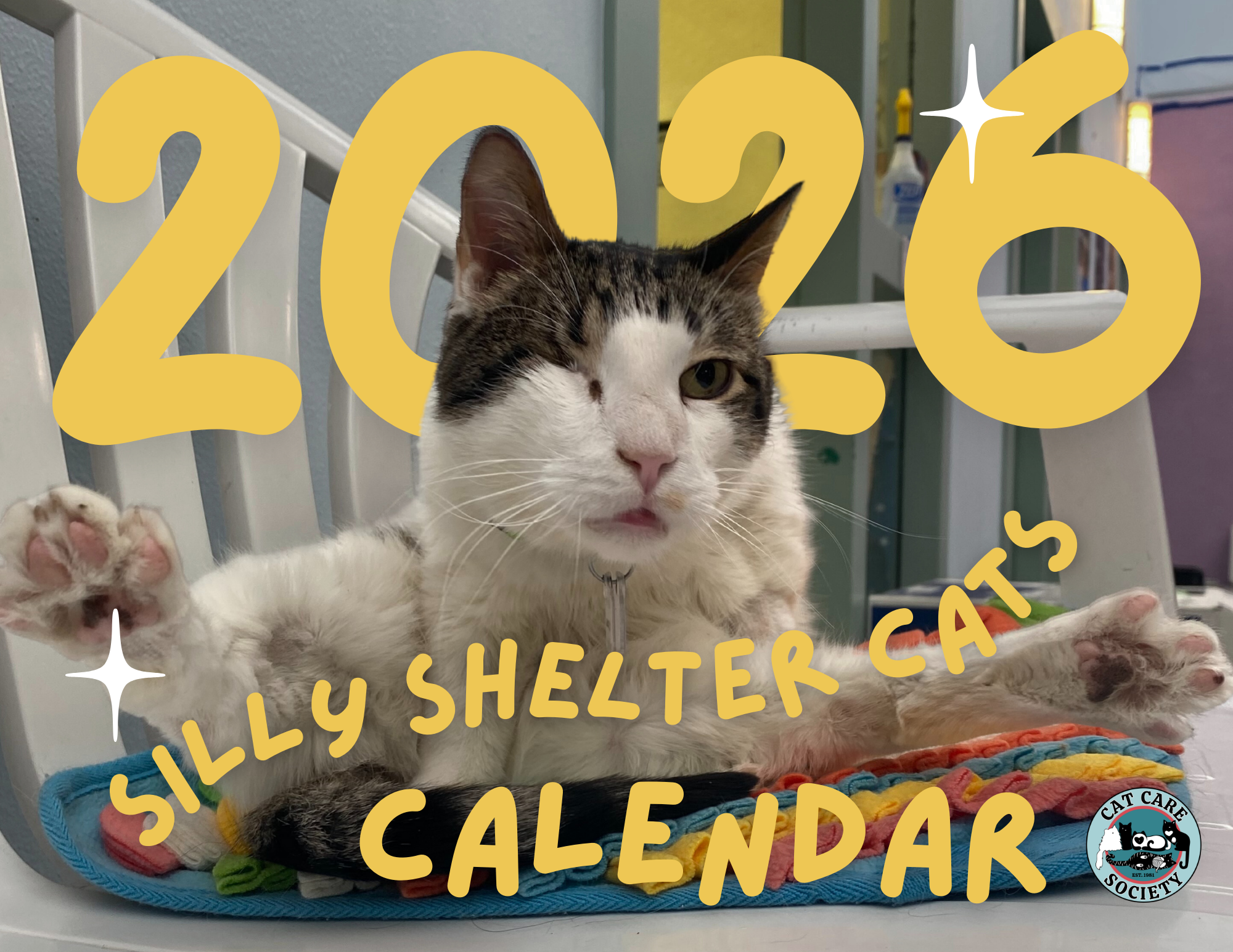
2026 Silly Shelter Cats Calendar – Now Online!
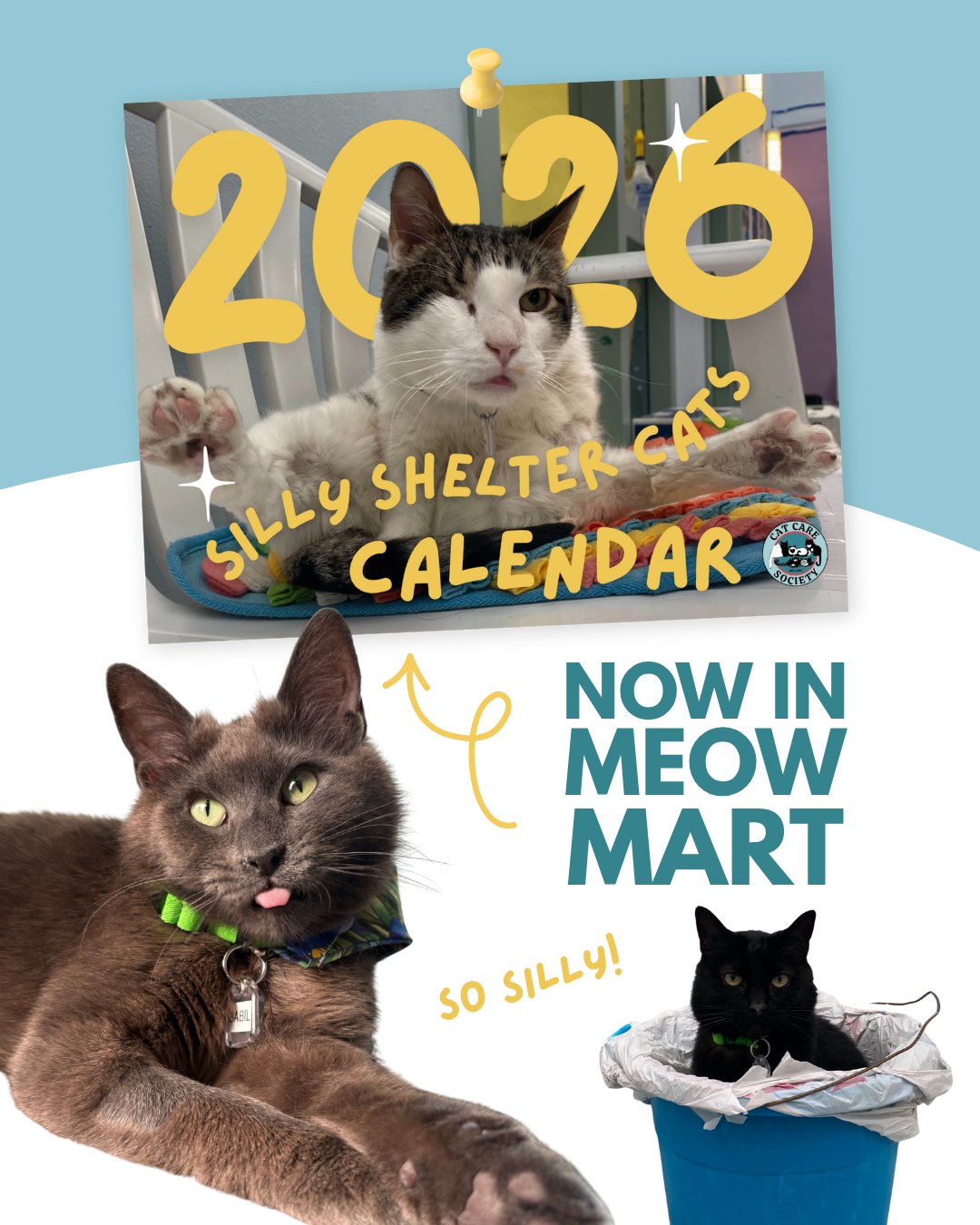
The 2026 Cat Care Society calendar is now available for sale online or in our Meow Mart store in the shelter!
Grab your “Silly Shelter Cats” calendar today featuring silly pictures from our adoptable cats, plus photo updates from some of our amazing alumni!
Shipping is available to all U.S. states for just $5.

Feline Herpes (FHV-1): Demystifying Myths and What You Need to Know
If you’ve ever browsed cat adoption profiles and come across the phrase “feline herpes positive,” you might hesitate at first. It sounds intimidating—but it doesn’t have to be. With a bit of knowledge and some extra loving care, cats with FHV-1 can live happy and healthy lives just like any other cat. In this article, you’ll learn what feline herpes is, what can trigger flare-ups, and how simple, informed care can make adopting an FHV-1 cat a deeply rewarding experience.
What is feline herpes and how is it spread?
Because of its latency and potential reactivation, FHV‑1 is often misinterpreted as a chronic disease—but it behaves more like a “flareable” virus than a constantly debilitating one.
Feline herpesvirus type 1 (FHV‑1), also called feline viral rhinotracheitis (FVR), is one of the most common viral infections in cats. Any cat can contract FHV-1, but younger cats are most often affected. FHV-1 can be spread through saliva as well as nasal and eye discharge, either directly from the cat or from a contaminated object like a toy or food dish. After initial exposure, the virus typically causes an upper respiratory and ocular infection (sneezing, nasal/eye discharge, conjunctivitis) lasting around 10–20 days in mild cases.
Even once the acute symptoms have resolved, the virus remains in a dormant state in nerve tissues for the cat’s life. The virus is most likely to reactivate if the cat experiences stress or an immune system challenge. When it reactivates, it causes a flare-up. Many cats experience very mild or even subclinical symptoms when a flare-up occurs.
FHV-1 vs. FIV vs. FeLV
It’s easy to confuse FHV‑1 with other feline viruses like FIV (feline immunodeficiency virus) or FeLV (feline leukemia virus), but they’re quite different. FHV‑1 is a respiratory virus that causes flare-ups like sneezing and eye discharge, but doesn’t impact a cat’s immune system the way the other two do. FIV is an immune-compromising virus primarily spread through deep bite wounds, while FeLV is a retrovirus that can suppress immune function and is more easily spread through prolonged close contact like grooming or shared dishes. Each virus has its realities, but none are an automatic disqualifier for a loving, quality life.
Myth vs. Reality: Common Misconceptions About FHV-1
Myth 1: “Having FHV-1 means the cat will have a low quality of life that’s filled with constant illness and discomfort.”
Reality: Most cats recover from initial infection and go on to lead essentially normal lives. While younger kittens, immunocompromised cats, or those with other illnesses might experience a more severe disease, serious outcomes are relatively rare in otherwise healthy cats.
Myth 2: “A cat with FHV-1 will always be symptomatic.”
Reality: Many cats are asymptomatic carriers most of the time, with flare-ups only under stress (e.g. moving, travel, other illness). In fact, viral shedding (when the cat is contagious) is much more likely during active episodes; in dormancy, shedding is minimal or absent.
Myth 3: “Herpes in cats is like herpes in people and can spread to humans or dogs.”
Reality: FHV‑1 is species-specific; humans and dogs cannot contract feline herpes.
Myth 4: “You can cure FHV-1 completely.”
Reality: There is no cure for herpes in cats. The goal is managing symptoms, reducing flare frequency and severity, and supporting the cat’s overall health through good nutrition and enrichment.
Myth 5: “You can prevent FHV-1 completely.”
Reality: One of the core vaccines recommended for kittens and adult cats by the Feline Veterinary Medical Association is the FHV-1 vaccine. While this vaccine doesn’t completely eliminate the chances of the cat contracting FHV-1, it is highly effective at preventing severe illness, including symptom severity and duration, and it also helps limit the cat’s viral shedding and how contagious it is to other cats. This vaccine is often administered as part of a combination vaccine called FVRCP, which protects against Feline Viral Rhinotracheitis, Calicivirus, and Panleukopenia. All cats at Cat Care Society are given the FVRCP vaccine according to the recommended schedule.
As you can see, the reality is that cats with FHV-1 can still live long, happy lives with proper care, love, and a stable environment that supports their health and comfort.
Helpful Things to Know Before Adopting a Cat with FHV‑1
If a shelter informs you that a cat you’re interested in adopting has FHV-1, keep the following considerations and tips in mind to help your future feline friend thrive:
1. Review and discuss the cat’s medical records and history
At CCS, if a cat is suspected of having feline herpes, it will be noted in their medical records along with information about the virus. It’s also important to understand if the cat has any other co-existing conditions, like upper respiratory illness or eye concerns, that might complicate flare management. Understanding the individual cat’s history gives you a more accurate sense of what to expect so you can be prepared. You should also share this information with your veterinarian so they can create a treatment and management plan. In most cases, FHV-1 symptoms are non-life threatening and the cat will respond well to general supportive care.
2. Prepare for occasional flares
Be aware of the respiratory and ocular signs of a flare-up, such as sneezing, watery eyes, discharge, and corneal irritation or ulcers, especially in times of stress. During those times, vet support (antivirals, topical ocular medication, secondary infection treatment) plus extra care at home can often resolve symptoms.
3. Stress reduction is essential
Stress is one of the strongest triggers for viral reactivation. Strategies to help minimize stress include:
- Creating a calm, stable environment with hiding spots, vertical spaces, predictable routines
- Minimizing abrupt changes (moving, new pets, loud renovation)
- Using enrichment (puzzles, play, cuddles, and other activities your cat enjoys)
- Avoiding overcrowding or competition in a multi-cat home, e.g., make sure there are adequate litter boxes, feeding time is comfortable, and there’s a place for the cat to have alone time when needed
4. Supportive care—daily and during flares
Even when asymptomatic, certain practices, in addition to stress reduction, can reduce flare risk and flare severity:
- Keep vaccinations current (especially FVRCP).
- Maintain high nutrition and hydration.
- During a flare, provide extra comfort (warm, humid environment, nasal/ocular cleaning, appetite support), follow vet-prescribed medication instructions.
- If in a multi-cat household:
Adopting a Cat with Herpes Is a Worthy Decision
Many potential adopters hesitate when they see an FHV-1–positive cat, but choosing to adopt one and offering them a loving home can be truly life-changing—for both of you. Here at CCS, we’ve received many heartwarming updates from adopters whose herpes-positive cats are thriving, underscoring that with care and compassion these cats can live long, joyful lives. If you’d like more information on FHV-1, including details on how the virus works and common treatment regiments, check out this great article by VCA Animal Hospitals.
About the Author: Beth Dokolasa is a volunteer for Cat Care Society and serves on the Board of Directors. She is an instructional developer for Natural Grocers and lives in Indian Hills, Colo., with her husband, daughter, and two cats, Techno and Digit.

Why Every Cat Needs Routine Vet Checkups
When was the last time you took your cat for a wellness exam? If you can’t remember, this article is for you—and you’re definitely not alone. Many people don’t consider taking their cat to the vet unless there’s an obvious issue, but this can unfortunately jeopardize their health and well-being. Cats are experts at hiding pain and illness, and by the time a problem becomes visible, it may already be advanced. Routine veterinary care is one of the most important things you can do to keep a cat healthy throughout their life.
Why Wellness Checkups Are Important
Cats instinctively mask pain or weakness. Problems common for cats, such as kidney disease, dental disease, or thyroid issues, can develop silently for months or even years. Regular wellness exams give veterinarians the chance to catch developing issues before they become more serious, improving long-term health and treatment outcomes.
Wellness exams cover much more than a simple once-over. Vets examine the cat’s teeth, skin, heart, lungs, weight, eyes, joints and internal organs. They also recommend vaccines, blood work, and parasite prevention. Addressing problems early usually means less invasive treatment, lower costs, and smoother recovery.
Wellness checkups are also a great time for you to ask any questions you might have specific to your cat, such as food recommendations, dental care, dietary supplements, or behavioral concerns.
What if my cat is an indoor cat?
Many people assume indoor cats are safe and need less medical care. While indoor living reduces some risks, it does not eliminate certain diseases or chronic medical issues. Indoor cats commonly struggle with obesity, dental problems, stress-related conditions, and age-related diseases that develop over time. Vets recommend checkups for indoor cats just as consistently as outdoor cats.
How Often Should Your Cat Receive a Checkup?
Cats often reach their senior years before their owners notice the subtle behavioral changes that come with aging. Because age-related illnesses can progress more quickly in older cats, more frequent checkups help ensure timely diagnosis and better support your cat’s health and comfort. Below are the minimum visit recommendations by the Merck Veterinary Manual based on cat age.
- Kittens: Every 3-4 weeks until they are about 6 months old
- Adult cats: At least once a year
- Senior cats (over 8 years): Twice a year for earlier detection of chronic issues
Don’t wait for the next scheduled checkup if you notice any changes in your cat, such as shifts in appetite, grooming habits, litter box behavior or output, energy levels, sneezing, increased scratching, or any other behavioral changes—make an appointment with your veterinarian. Addressing concerns early is not only better for your cat’s health but it can also give you peace of mind.
Schedule Your Cat’s Checkup Appointment Today!
The CCS website lists a range of veterinary and medical resources for cat owners, including wellness services, low-cost clinics, and emergency care options. If you have pet insurance, review your plan details to see whether you also enrolled in a pet wellness plan, which can help cover routine care expenses. New to pet insurance? Check out our insurance guide for cat owners. All of these resources exist for a reason: cats need medical support just as much as dogs do, they are simply better at hiding it.
About the Author: Beth Dokolasa is a volunteer for Cat Care Society and serves on the Board of Directors. She is an instructional developer for Natural Grocers and lives in Indian Hills, Colo., with her husband, daughter, and two cats, Techno and Digit.

2026 Silly Shelter Cats Calendar – Now Online!

The 2026 Cat Care Society calendar is now available for sale online or in our Meow Mart store in the shelter!
Grab your “Silly Shelter Cats” calendar today featuring silly pictures from our adoptable cats, plus photo updates from some of our amazing alumni!
Shipping is available to all U.S. states for just $5.
Open Hours
Tues–Weds: Closed
Sign up for our Mewsletter!
Shop Our Wishlists
Please include your full name on a gift note when sending donations through Amazon or Chewy, so we can properly acknowledge your generous contribution! Without it, we won’t be able to identify that the items are from you. Also, please keep your shopping receipt, as it serves as your official donation receipt.
